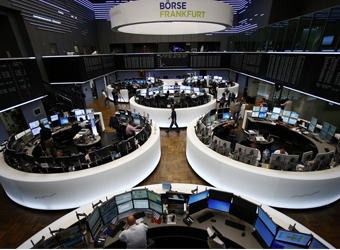European markets closed under pressure on Friday, as investors tracked the weak performance seen in markets overseas, while keeping an eye on the massive storm nearing the U.S.
The pan-European Stoxx 600 eked out gains by the close, finishing up 0.15 percent provisionally. On the week however, the index ended 0.17 percent down. Sectors pointed in different directions by the close.
Looking to bourses, the U.K.’s FTSE 100 underperformed fellow indexes, closing down 0.26 percent, while the French CAC and German DAX finished relatively flat, off 0.02 percent and up 0.06 percent respectively.
Commodities were in focus on Friday, with both energy and basic resources finishing trade lower than their fellow sectors. The oil sector closed lower, as prices sank, with U.S. crude off more than 1.5 percent by Europe’s close. At 4:30 p.m. London time, Brent was trading at $54.21, while U.S. crude fell further, last standing at $48.26.
Meanwhile, basic resources sank 1.77 percent as a sector, as metal prices like copper, nickel and lead all posted sharp losses. In addition, miners were under pressure following softer-than-expected export data from Beijing. Anglo American, BHP Billiton and Antofagasta all closed over 3 percent lower.
Retail also suffered from a poor performance on Friday, with U.K. firms Marks & Spencer and Kingfisher closing at the bottom of the index, after Deutsche Bank cut its target price on the stocks. The broker also modified its rating on WH Smith, causing it to slip 1.5 percent.
Looking at individual stocks, Akzo Nobel issued a profit warning, citing cost inflation and currency headwinds, and said it would fall short of reaching the 100 million euros ($121 million) of 2017 operating profit it promised when blocking a recent takeover attempt.
Shares of the paints and industrial coatings firm came off its lows, to close down 0.63 percent.
Meanwhile, Greene King slumped to the bottom of the benchmark, after it reported a dip in pub like-for-like sales for the 18 weeks through to September 3. The U.K. pub retailer also said it expected weaker consumer confidence to persist in the near term. Shares tumbled 15.7 percent.
On the other end of the spectrum, French investment bank Natixis was one of the STOXX 600’s top performers, closing up 2.64 percent after Kepler Cheuvreux raised its target price on the stock. Danish transport firm DSV meanwhile, rose 2 percent after JP Morgan started with an “overweight” rating on the stock.
The latest movements of Hurricane Irma continued to keep investors on their toes on Friday, with the storm projected to hit Florida over the weekend.
On Friday, the National Hurricane Center downgraded Irma to a Category 4 storm, however it still continues to describe the storm as “extremely dangerous.” In addition, the head of the Federal Emergency Management Agency said that Irma would devastate parts of the U.S., Reuters reported.
Consequently the nerves surrounding Hurricane Irma seeped into Wall Street on Friday, with U.S. stocks trading mixed around Europe’s close, with insurance stocks facing pressure.
Meantime, the ECB kept its benchmark interest rate unchanged Thursday and said it stands ready to increase its asset purchase program if needed.
Draghi said low inflation rates meant that a “substantial degree” of monetary policy remained necessary until the end of the year at least. But he added the central bank would decide in the fall – at its October meeting – on the status of its bond-buying program for next year.
Source: CNBC


